Budapest Short-faced Tumbler Pigeon Breed
Let’s play an easy guessing game. What pigeon is most popular for its flying capabilities and unique look? You know it already by the title. Budapest Short-faced Tumbler Pigeon.
It is a beloved member of the pigeon family tree. Not only these pigeons are striking in appearance but also sociable. However, Budapest pigeons are fancy birds and require high maintenance.
So, it’s popular among pigeon fanciers over regular pet owners. I came across Tumbler pigeons once and needless to say; their patterns and tail range make them quite different than all other pigeons I’ve ever seen.
Check out all the details about Budapest Tumbler pigeon below including its origin, breeding, maintenance, and features.
Budapest Short-Faced Tumbler Pigeon Profile
| Name | Budapest Short-faced Tumbler Pigeon |
|---|---|
| Scientific Name: | Columba Livia Domestica |
| Common Names: | 01. Budapest Tumbler Pigeon 02. Short-faced Tumbler 03. Hungarian Short-faced Tumbler 04. Budapest Tumbler 05. Budapest Short-beaked Tumbler Pigeon |
| Origin: | Budapest, Hungary |
| Size: | Medium |
| Weight: | 8.8 to 14.1 ounces |
| Lifespan: | 5 to 10 years |
| Physical Features: | Short beak and feet, agile flight, homing instinct |
| Temperament: | Calm and docile |
| Behavior: | Sociable and acrobatic |
| Special Features: | Short face, different plumage, acrobatic flight capability |
| Breeding and Maintenance: | Healthy and suitable nesting, monitor health, balanced diet, safe shelter |
| Common or Popular Varieties: | 01. Rock Pigeon 02. Homing Pigeon 03. Racing Homer Pigeon |
Interested in similar topics on pigeon breed:
Overview Of Budapest Short-faced Tumbler Pigeon
Budapest Short-faced Tumbler Pigeon is also popularly known as Short-Faced Tumbler and even Hungarian Short-faced Tumbler. It is a pigeon breed that has incredible flying capability and domesticated nature.
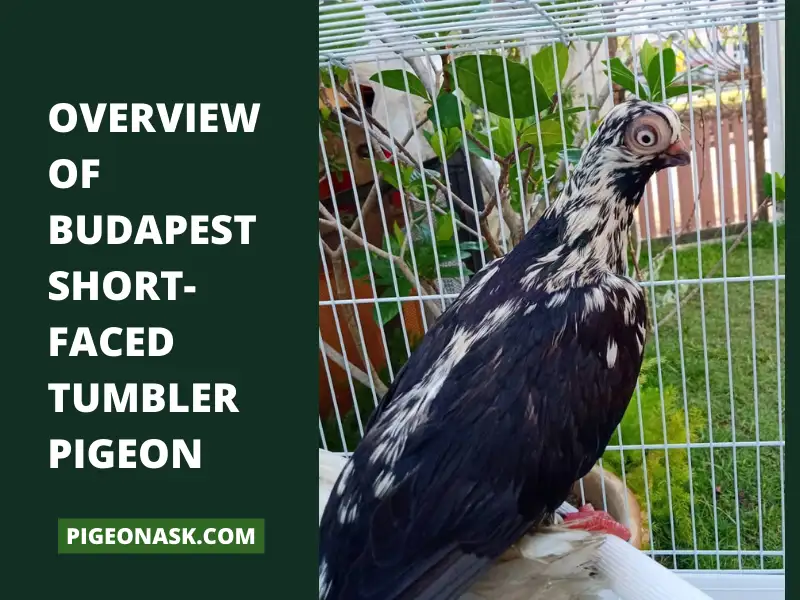
Even though, it was bred for aerial acrobatics; now it’s known for its plumage and racing competition.
These originated from Hungary and Budapest. Also, have a short face with medium sized bodies. Budapest pigeons are gentle, social, and great as pets. Rock Pigeon, Jacobin Pigeon, Show King Pigeon are some of its common names.
History, and Origins of Budapest Short-faced Tumbler Pigeons
The history and origin of Budapest Short-faced Tumbler Pigeons goes way back to the late 19th century and early 20th. These were found in Hungary and Budapest.
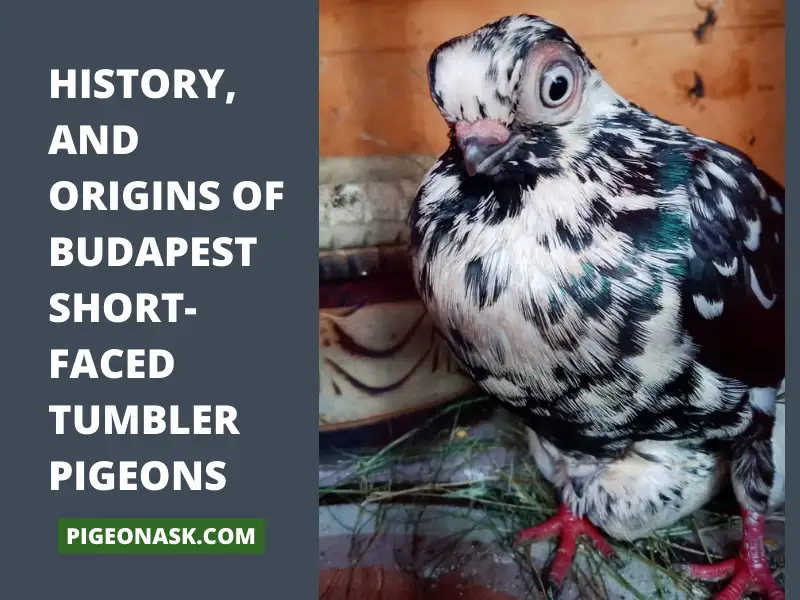
Selective Breeding
- There are theories that local pigeon fanciers artificially originated Budapest Pigeon breed. They wanted a unique pigeon that had excellent tumbling ability with a strong appearance and short beak.
- So, fanciers chose selective pigeon breed with selective features to create the Budapest breed. Also, though selective breeding the fanciers ensured that the Budapest pigeon generation has fine acrobatics characteristics.
- But there’s no exact documentation behind this theory and some argue mating of local and European breed is the reason.
Tumbling
- Budapest Short-faced Tumblers are popular for their noteworthy appearance but also their tumbling. Historically, Budapest became a host of pigeon flying competitions and organized events.
- Other breeds and birds are often trained to fly as Budapest pigeons. As a matter of fact, the city of Budapest has become an attraction for pigeons’ fanciers.
- Internationally, this breed is currently famous and its genetical line has spread to different countries.
Physical Characteristics and Features
Short-faced Tumbler are distinct are asy to tell apart. They have eye-catching features.
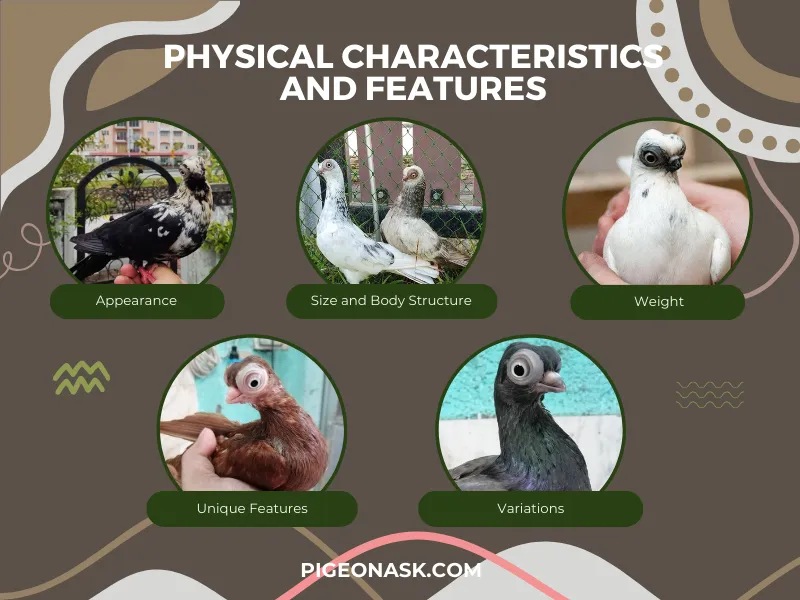
Appearance
Budapest Short-faced Tumbler has a stubby yet short beak. This feature makes it very different from other pigeon breeds.
These pigeons have slightly round and broad heads. However, they have well-proportioned bodies and a muscular physique. The eyes resemble frog eyes yet complement their body structure.
Size and Body Structure
Usually, these birds are mid-sized and about 10 to 12 inches in length. The chest area is prominent and has strong shoulders compared to other pigeons. On the contrary, the legs are short and that makes the feet small.
Budapest pigeons always keep a upright posture.
Weight
Weight can vary from a pigeon to pigeon due to environmental, genetical and food habits.
Budapest Short-faced Tumblers are generally weighted from 8 to 14 ounces or 400 grams at max.
Unique Features
Fan-shaped tail and prominent eyes makes them quite different from other pigeons.
Their features are composed of 13 to 14 strings. Moreover, these feathers give them an advantage in flying and protecting themselves.
Variations
Common color types of this breed are black, blue, red, white, and yellow. You will find different patterns in them including mottling, checks and even bars.
Those breeds that mated outside of their own can show splashed patterns making them eye-catching.
Distribution And Habitat
A common misconception is that this pigeon breed is only found in Budapest. However, from its origin it’s been popular worldwide.

Geographic Distribution
You’ll find these pigeons mostly in urban and suburban areas. Because it’s said that they are selectively breed in Budapest and Hungary, they are not native in the wild.
The distribution is influenced by bird fanciers and breeders that keep them in many parts of the world.
Habitat Preferences
Budapest pigeons do not have any natural habitual preference as I explained before due to selective breeding. So, they are suited for petting and keeping in lofts or dovecotes.
Because they are highly suited to human-made environment they prefer urban environments.
Urban and Rural Habitats
It’s uncommon to find this breed in rural settings unless any one is keeping pet. Due to selective breeding, this breed goes for urban areas where they are taken care of.
Migration and Seasonal Movements
Unlike wild pigeons, Budapest Short-faced Tumblers do not show any migratory or even seasonal behavior or move. Because they are popular as pets, Tumblers always receive care and attention.
Mostly, they live in sheltered places that requires no change even if the environment changes.
Threats and Conservation Status
Budapest Short-faced Tumbler is a well-protected breed due to its demand among bird fanciers and breeders. But as a bird, it faces threat from preadtors like racoons, fox, and disease.
Behavior and Traits of Budapest Short-faced Tumbler Pigeons
Just like other pigeons, the Budapest Short-faced Tumbler pigeons are gentle birds with strong appearance.
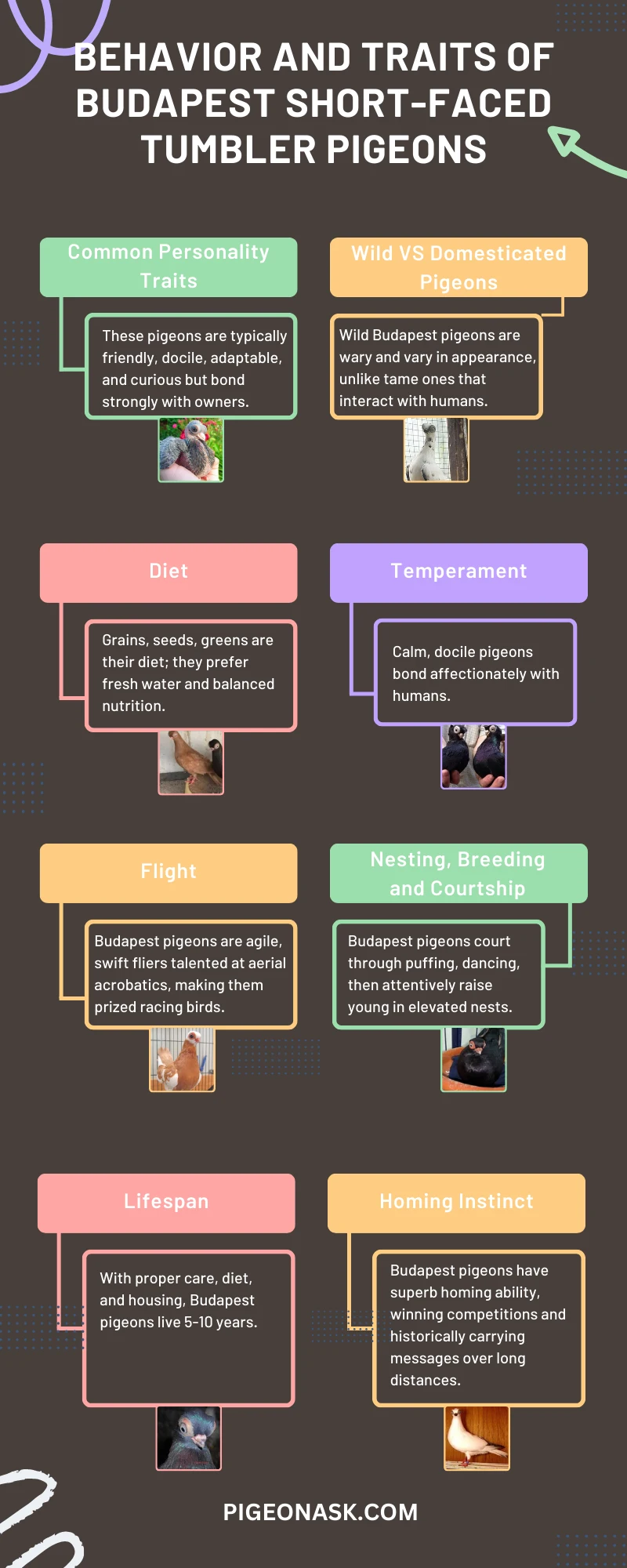
Common Personality Traits
Most commonly, these pigeons are sociable and friendly personalities. They are docile and adaptable to their environment. Moreover, they are curious in nature yet have a strong attachment to their owners.
Differences Between Wild and Domesticated Pigeons
Wild Budapest pigeons usually avoid human interaction and are cautious. On the contrary to their domestic counterparts, they show different range of patterns and colors.
Domestic ones easily mix with humans and have no problem in handling.
Diet
Grains, seeds, leafy greens are their prime diet. Budapest pigeons always prefer freshwater. Some owners provide their pets, supplements, and pellets to ensure balanced nutrition.
Temperament
As I mentioned above, these pigeons are calm and docile in nature. They have strong bond with their humans and are affectionate.
Flight
Have you ever wondered how skilled are the Budapest Short-faced Tumblers in flying? These birds have swift yet graceful flying patterns.
Also, they can range in different acrobatics while flying. In fact, Budapest pigeons are the most popular breed for pigeon racing competitions.
Nesting, Breeding, and Courtship
Budapest Short-faced pigeons always engage in elaborate courtship and display. Sometimes they puff their feathers and perform aerial dances to impress their mates.
However, they nest in elevated locations and often in nesting boxes. As parents, they are attentive and share incubation responsibilities and raise their chicks.
Lifespan
Different factors like care, diet and exposure affect their lifespan. However, these pigeons can live from 5 up to 10 years.
Homing Instinct
In homing pigeons’ competitions, these pigeons often win due to their incredible homing instinct. Even over significant distances, they can find their way back. So, in the past they were valuable to carry messages.
Breeding And Maintenance
Just like any other pigeons, these breeds need planning and careful maintenance. Unethical breeding practice has been a threat to Budapest breed.
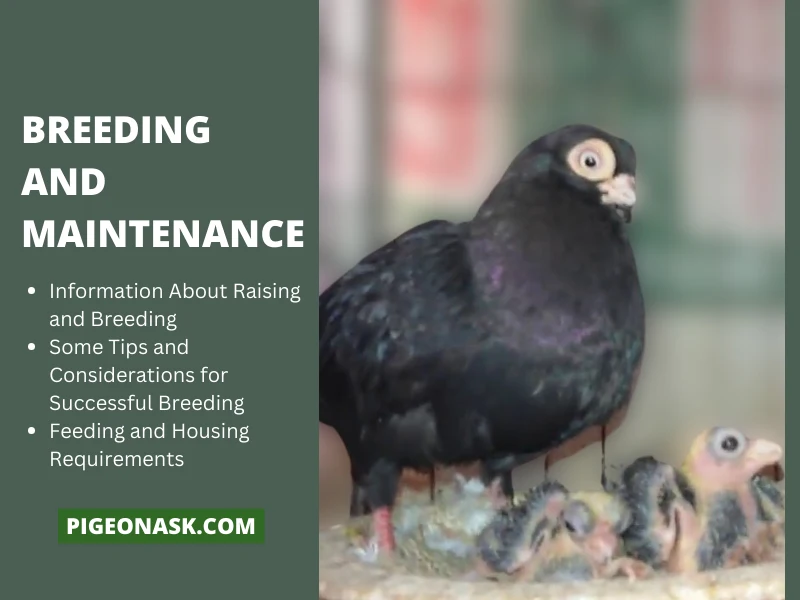
Information About Raising and Breeding
For breeding, healthy pairs of Budapest Short-Faced pigeons are required. Usually, these pigeons reach their sexual maturity around 6 months.
During summer and spring, brewers provide these pigeons with a perfect nesting area and more likely a ledge or nesting box with bedding. Females will lay egg one or two and partners share incubation duty around 19 days.
After the eggs hatch, they stay in constant care of their parents. Also, fledge after a month.
Some Tips and Considerations for Successful Breeding
If you are planning to have these pigeons, then first you must monitor their health. Also, provide them with a balanced diet that has clean water, seeds, and grain. Hygiene is the key to preventing any disease.
The nesting area should be disturbance and predator free. Any kind of stress in the incubation period can stress the parent pigeon and affect the chick. Also, continue giving care and nutrition after the eggs are hatched.
Feeding and Housing Requirements
Let’s start with the do nots. Avoid feeding any kind of avocados and chocolates. You’ll be surprised to know how many owners do that. Provide a diet that includes pellets, seeds, leafy greens, and grains.
Always provide fresh water for the Budapest pigeons. They should be kept in a loft or aviary. Also, the housing must tackle extreme weather and yet provide enough ventilation. Clean the area twice a week.
Conclusion
Budapest Short-faced Tumbler Pigeon are rare pigeon breeds. Due to their short beak, they often face survival problems. Also, they have a high mortality rate for the same reason. That’s why they are better as pets.
Some unethical breeders are using them solo for pigeon racing and mistreating them in the process. They are lovely as pets and while owning one be sure to choose an ethical breeder.
If you liked this article then make sure to follow our Facebook, Twitter and Pinterest.
